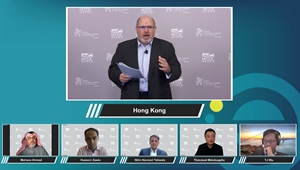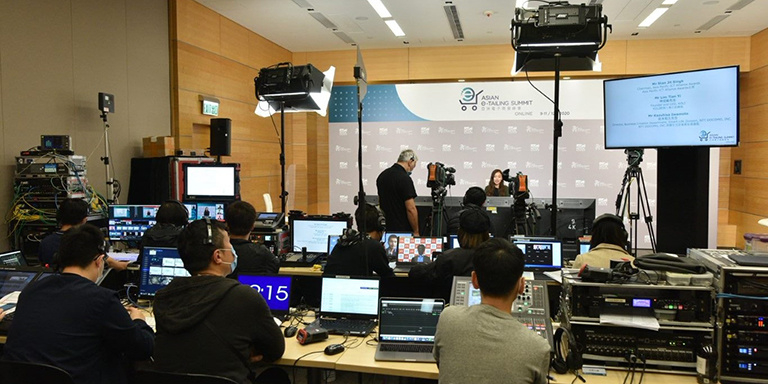The COVID-19 pandemic and restrictions on movement and gatherings has an upside for several industries, especially e-commerce, delegates to the fourth Asian E-tailing Summit heard. Mobile e-commerce has grown particularly strongly in Asia, with Mainland China taking the lead.
The summit, organised by the Hong Kong Trade Development (HKTDC), ran online from 9 to 11 December, featuring more than 40 business professionals from e-tailing service giants, online retail platforms and brand representatives. More than 11,000 viewers from 43 countries and regions joined the global live streaming of online webinars and presentations which examined the current business practices of small and medium-sized enterprises (SMEs) and shared global success stories and solutions, helping enterprises capture the opportunities brought by digitisation.
Opportunity summit

The summit keynote, “Cross-border E-commerce in the New Digital Era”, featured heavyweight speakers from the United Arab Emirates, Thailand, Malaysia and Taiwan, including corporate representatives from FedEx, KPMG, Dubai South, eRomman, Priceza Co and SAP.
Anson Bailey, Head of Technology, Media & Telecoms for Hong Kong and Head of Consumer & Retail for ASPAC (Asia Pacific) at KPMG, said the trend for online purchasing, already accelerated by the pandemic, will become mainstream, with the global e-tailing market expected to grow 16.5% in 2020. He also observed that Asia will play a major role in the change. For instance, there were more than 40 million new internet users in the region in 2020 alone. In terms of cultural influence, shopping festivals that originated in Mainland China are becoming critical sales drivers. Among the 250,000 brands taking part in the latest Singles’ Day campaign in November, 470 generated sales of Rmb100 million (US$15.3 million) or more. Mr Bailey said enterprises should embrace the purchasing habits of tech-savvy millennials and tech-native Gen Z consumers. He also remarked that the future business model will transform from “retail” to “consumer commerce”, in which retailers will transform into marketplaces and suppliers to sell to consumers directly on platforms, cutting out the traditional middlemen.
Mohsen Ahmad, Dubai South’s CEO for Logistics District, shared the blueprint for developing a global logistics hub. Taking advantage of Dubai’s geographical location and new airport development, he explained how the Dubai South project would bring a new and more efficient e-commerce ecosystem.
In addition, Hussein Zawia, CEO and Co-founder, eRomman emphasised the potential of the Middle East market, which he said has a higher e-commerce space than any other region. Mr Hussein pointed out there is increasing demand for international brands’ products in the region, with local choices being limited. He added that the pandemic has further boosted this growing demand by driving traditional consumers to shop online.
Responding to increasing global demand in the e-commerce market, Nitin Navneet Tatiwala, FedEx Express Managing Director for Marketing of Product, Solutions and E-commerce in AMEA (Asia Pacific, Middle East and Africa), said enterprises need to change their management style and enhance the way they interact with customers. Using the example of FedEx, he noted that the scope of the changes made by enterprises should not stop at handling the sudden boost from the pandemic but should be more focused on long-term planning for future “peak of peaks” and shopping festivals.
Thanawat Malabuppha, CEO and Co-founder of Priceza Co, Ltd, told the session that even on local e-marketplaces in Thailand, most sellers are overseas companies, with the vast majority from Mainland China. These sellers open companies in other countries and offer a wide variety of products originating from the mainland. Favourable prices attract many local consumers. He believed this would become a big trend in other Southeast Asian countries.
TJ Wu, Director of the Centre of Excellence at SAP Customer Experience in Greater China, described his digital transformation model – SCOOP, (strategy, culture, organisation, operation and platform). He recommended top-down digital transformation, starting from the strategies and understanding the target culture, rather than making the information technology (IT) department the foundation of any transformation. He also said nurturing and acquiring talents is crucial to success in any organisation.
Mobile commerce

At the “The Rise and Reach of Mobile Commerce” session, global technology sector leaders gave their views on prospects for this rapidly emerging industry. Emily Leung, Senior Analyst at Euromonitor International, highlighted the significant role of mobile phones in the Asia-Pacific region (APAC), where 75% of e-commerce sales are on mobile devices – much higher than the global average of 54%. In 2019, mobile e-commerce sales in the region were US$740 billion, up 22% year-on-year, with 80% of online transactions in Mainland China made via mobile phones. The mainland is the current leader in mobile e-commerce and has the highest year-on-year retail value growth in the Asia-Pacific – 23%, compared to 14% in Korea and 9% in Japan. Ms Leung foresaw a trend for mobile e-commerce integrating with social media applications, and 5G technology had a potential to increase mobile traffic.
Stan Jit Singh, Chairman of the Asia Pacific ICT Alliance Awards, said m-commerce has more channels to reach out to mass communities, more payment methods, and greater accessibility. The younger generation in particular prefer using mobiles to shop online, giving m-commerce the edge over browser-based e-commerce, Mr Singh said. He also believed m-commerce is more advantageous for enterprises as it is easier to track customers and obtain feedback. Investment would be needed to address the cybercrime threat but he still believed m-commerce would reduce overall business costs for enterprises.
Lim Tian Yi, Founder and CEO of KOLI, described his consulting and investment examples to demonstrate how social media helps m-commerce grow. He also described a mobile-application launch framework.
Kazuhisa Iwamoto, Director of the Business Creation Department in the Smart-Life Division at NTT DOCOMO, INC, discussed 5G development by giving a brief history of mobile devices. Mobile phone functions have evolved over the years, from satisfying communication needs to acting as a transaction-enabler. The 5G era makes XR – an umbrella term for augmented, virtual, and mixed-reality technologies – compatible with mobile devices. Shopping would be more comfortable, convenient and fun, providing a very different experience for consumers, he said.
Practical tips
Several e-commerce elites provided advisory services to companies interested in setting up e-commerce platforms. Jonathan York, Consulting Manager at Euromonitor International, analysed how companies can succeed in the Association of Southeast Asian Nations (ASEAN) market through e-commerce and explored the digital consumer mindset in the region. Frankie Ng, Hong Kong Lead at Shopify, described how the brand uses a blend of technology and strategy to win in the increasingly competitive online environment, while Harrace Lau, Co-founder of eOneNet, introduced a 10-step internet success system that helps companies turn around their online business and expand globally. And Fione Tan, President at 28Mall, helped business owners wishing to enter this market resolve problems relating to cross-border logistics, customs clearance and import duties, local customer services and last-mile deliveries.
Related link
Asian E-tailing Summit

